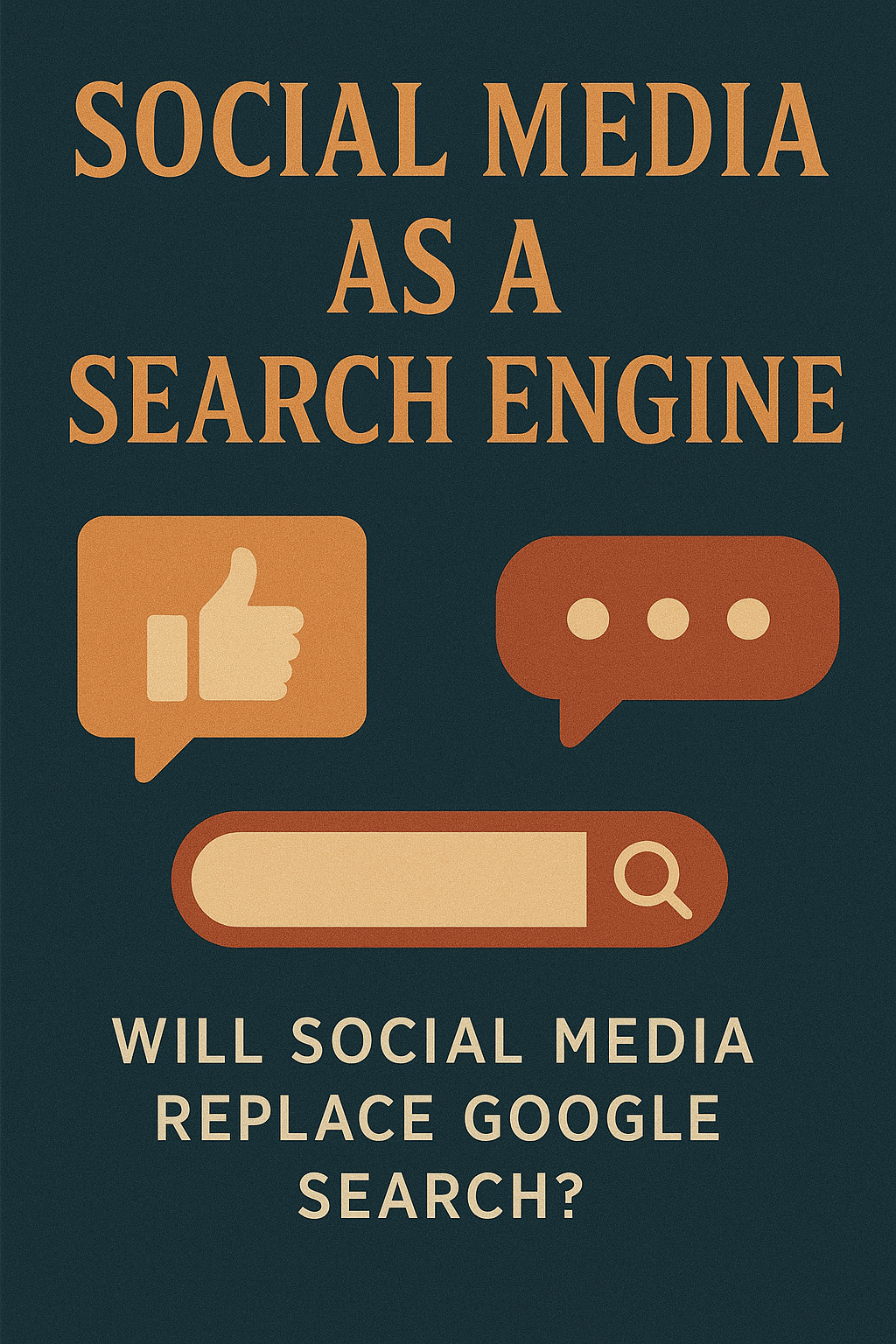In the digital age, we have seen how social media management has evolved from a simple communication tool to a powerhouse that shapes the way people interact, consume content, and even make purchasing decisions. Platforms like Facebook, Instagram, and LinkedIn are not just social networking sites; they are becoming the new search engines for millions of users. This raises an interesting question: will social media replace Google Search as the primary way people seek information online?
In this blog, we will discover the rising effect of social media platforms as search engines, their advantages and disadvantages over traditional search engines, and whether social media is truly poised to replace Google in the near future.
The Rise of Social Search
The move from traditional search engines to social media platforms for discovering information has been growing steadily over the past few years. What started as an alternative to searching through Google or Bing for product recommendations, local services, and even news updates has now become a norm, especially for younger generations. Facebook ad campaigns, Instagram marketing services, and even LinkedIn advertising solutions have proven to be successful methods of reaching targeted audiences, but they also highlight the trend of integrating search-like features directly within social media platforms.
For many people, social media has already become a go-to tool for finding relevant content. Whether they are looking for new fashion trends, tech gadgets, restaurant reviews, or advice on how to do a task, they now turn to social networks like Instagram, TikTok, or Twitter to get these answers. This “social search” behavior shows that social platforms are offering a more personalized, visual, and engaging way of browsing compared to traditional search engines.
Why Social Media is Gaining Popularity as a Search Tool
1. Visual Search
One of the key reasons people are shifting to social media for searches is the rise of social media content creation, particularly in the form of visual content. Social platforms like Instagram, TikTok, and Pinterest are inherently visual, which makes them ideal for users who want to see, rather than just read, their search results. A simple scroll through Instagram or Pinterest provides a wealth of images, videos, and tutorials that are far more engaging than traditional text-based search results.
2. User-Generated Content (UGC)
Another advantage of social media is the wealth of user-generated content (UGC) that can be a better resource for some search queries than professional websites. Reviews, personal experiences, and recommendations shared by users themselves often carry more weight than product descriptions on a company website. This is why social media platforms have become so crucial for product discovery and decision-making.
Whether it’s watching a TikTok video on a new kitchen gadget or reading Instagram stories about a local business, UGC is an essential part of the social search experience. This is where Facebook ad campaigns and Instagram marketing services provide businesses with a unique opportunity to showcase their products or services in a way that feels personal and authentic to the consumer.
3. Real-Time, Trending Content
Social media platforms are fast-paced and constantly updating with the latest trends and conversations. The Facebook ad campaigns and content on Instagram or Twitter are updated in real time, meaning users have access to relevant content that may not be immediately available on traditional search engines. The immediacy and up-to-the-minute updates offered by social platforms are critical in today’s fast-moving world of news and information.
For example, when a new product or service launches, people may turn to Instagram or TikTok first to see real-world demonstrations and reviews rather than searching Google for articles. This sense of instant gratification is something Google can struggle to match, making social platforms more appealing for quick searches.
4. Personalized Search Results
Search results on social media are highly personalized based on the user’s interests, past behavior, and even their social circles. Facebook, Instagram, and LinkedIn all use algorithms to tailor content to users, meaning the information you see is often more aligned with your preferences. This contrasts with Google’s approach, which primarily relies on keywords, backlinks, and SEO to determine search rankings. Social media platforms, on the other hand, allow for a deeper, more personalized search experience.
For instance, if you’re researching a new city to move to, Instagram’s location-based search feature can show you relevant posts from local residents, giving you insight into what it’s really like to live there. Similarly, LinkedIn advertising solutions can direct you to posts and articles from industry professionals that might be more valuable than a generic Google search result.
Social Media vs. Google Search: Which Is Better?
While social media is gaining traction as a search engine, there are still several aspects in which Google continues to outperform social platforms.
1. Depth and Accuracy of Information
Google is an information powerhouse. It indexes billions of websites, documents, articles, and media, ensuring that users can find the most accurate and comprehensive content available. Social media platforms, on the other hand, prioritize content that is visually engaging or tied to a trending topic, which may not always result in the most detailed or factual information.
Google also provides a wide variety of search tools, such as Google Scholar, Google Maps, and Google News, which are specialized for different types of queries. These resources make Google the go-to search engine for many users when they need in-depth research or specific data.
2. Credibility
When people turn to social media for information, there’s a level of trust that needs to be established with the content creator or brand. While social media content creation offers more authentic and real-time insights, it’s also rife with misinformation and content that’s influenced by paid promotions. Google’s search algorithm, on the other hand, tends to rank content based on credibility, helping users find trustworthy sources.
3. Targeted Advertising
Social media platforms have proven to be greatly effective for businesses through their Facebook ad campaigns and Instagram marketing services. These platforms allow advertisers to target precise demographics with precision, tailoring ads to users’ behaviors, locations, and interests. However, this can sometimes feel intrusive for users, especially if their social search leads them directly to sponsored content or ads that don’t feel relevant. Google, in contrast, allows for less personal targeting but maintains a broader and more objective approach to search results.
4. The Future of Search
While social media is undeniably changing the way we search for information, it’s unlikely that it will fully replace traditional search engines in the near future. Google continues to govern the search engine market because of its depth, accuracy, and vast resources. However, it’s evident that social media is becoming an increasingly essential part of the search ecosystem, especially as users prioritize convenience, real-time information, and personalized experiences.
In fact, the lines between social media and search engines are starting to blur. Google has already incorporated social features into its search results, such as displaying Twitter posts or YouTube videos in response to certain queries. Similarly, social media platforms are becoming more search-friendly, with new features like Instagram’s shop and Pinterest’s visual search tool adding more layers to the search experience.
Conclusion: The Future of Social Media and Search
It’s clear that social media platforms are not just a place for social interaction; they are rapidly becoming an integral part of how we discover information, products, and services. Whether through LinkedIn advertising solutions, engaging Instagram posts, or viral TikTok trends, social platforms are challenging Google’s dominance as the primary search tool.
However, will social media completely replace Google Search? Unlikely. Google remains the go-to for comprehensive, detailed, and credible search results. That said, the future of search will undoubtedly be more integrated, with social media playing a larger role in how we find and interact with content online.
For businesses, understanding this shift and leveraging social media management tools alongside traditional search engine optimization (SEO) strategies will be crucial for reaching the right audience in the right way. As social platforms continue to evolve, so will the way we search, interact, and consume content in the digital world.





